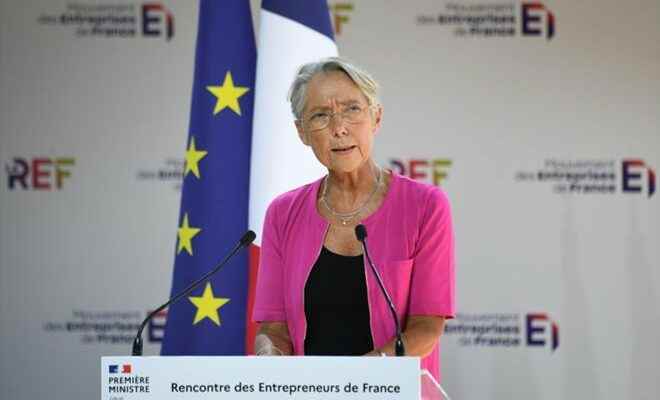French Minister of Public Accounts Gabriel Attal in Paris, July 4, 2022 (AFP/Archives/Ludovic MARIN)
Beware of the boomerang effect: the debate on the taxation of “superprofits” has taken an unexpected turn in recent days, the executive finding itself accused of being itself a “superprofiteur” through tax revenues greater than its expectations.
Invited on Friday on BFM TV / RMC, the Minister of Public Accounts Gabriel Attal once again had to deny the existence of a “kitty” within the State, while the accusations of excessive enrichment weighed so far rather on large companies such as TotalEnergies or CMA-CGM.
“There are additional (tax) revenues but we spend a lot more to protect, to support the French,” he said.
With high inflation in recent months – accelerated by the conflict between Russia and Ukraine – and the good resistance of employment and growth in France, tax receipts are in fact very dynamic.
In a press release on the state’s budgetary situation, the Ministry of Finance also indicated on Friday that at the end of July 2022, “net tax revenue (established) at 172.5 billion euros against 144, 1 billion at the end of July 2021”.
Income related to corporation tax increased by nearly 16 billion euros over one year, and those from VAT by 7.7 billion.

(AFP/Archives/Ludovic MARIN)
What accredit the thesis of the boss of the Medef Geoffroy Roux de Bézieux, who had estimated Monday that “the biggest superprofiter is the State”?
Not for Gabriel Attal, who takes the example of VAT on gasoline.
“With the increase in gasoline prices”, the State received an additional VAT of “3 to 4 billion euros”. But “we spent 7 billion euros for the fuel rebate”, argued the Minister of Public Accounts.
“The state does not get rich in the situation, on the contrary”, he continued, in line with comments already made by Elisabeth Borne.
On Monday, the Prime Minister had replied to the president of Medef that “no, there (was) no superprofits on the side of the State”.
Despite these denials, over the past week the government has had to face a perilous backlash on an issue that has plagued it since this summer.
– Compromise –
Originally, it was indeed a few large companies with exceptional financial results that were in the sights of the left opposition.

A service station of the French giant TotalEnergies in Lucciana, Corsica, on February 14, 2022 (AFP/Archives/Pascal POCHARD-CASABIANCA)
But rather than taxing them as demanded by the opposition, the government encouraged them to lower their tariffs, an appeal heard by TotalEnergies and CMA CGM.
“A tax has never improved the lives of our compatriots. Our compatriots need money in their pocket, not in the pockets of the state”, insisted the Minister of Economy Bruno Le Maire before Parliament in July .
Returning from the summer break, his line has not changed and the government’s N.2 is now making foot calls to the banking and insurance sectors to reduce bank charges or insurance premiums.
But supporters of a tax have not given up.
“We do not have the impression that the tax code is able to distribute fairly (profits), especially since the Covid”, judged Esther Duflo on Friday on France Inter. So “the tax on superprofits is a really good idea,” continued the co-winner of the 2019 Nobel Prize in Economics.
At Matignon, the tone has become slightly more conciliatory about such taxation.
“I think that companies will show responsibility” by acting for the purchasing power of the French, said Thursday Elisabeth Borne.

Prime Minister Elisabeth Borne, during the Meeting of French Entrepreneurs, in Paris, August 29, 2022 (AFP/Archives/Eric PIERMONT)
But “if some do not do it, we are not closing the door” to an exceptional taxation of superprofits, said the Prime Minister.
The question promises to come back in the debates on the draft 2023 budget, which the government must present at the end of the month.
Deputies from the presidential camp are already pleading for a compromise, in the form of a fund to finance the energy transition fed by the “superprofits” of companies.
An “interesting” idea for Bruno Le Maire. It remains to sell it to the opposition, determined to negotiate their votes dearly while the government only has a relative majority in the National Assembly.
© 2022 AFP
Did you like this article ? Share it with your friends with the buttons below.




